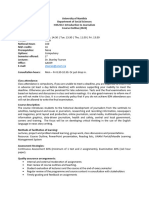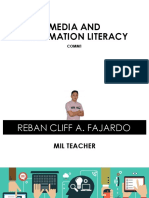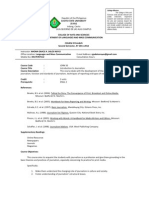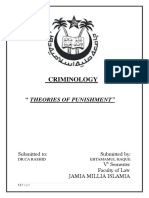journalism
Uploaded by
sultan kasimjournalism
Uploaded by
sultan kasimCourse Syllabus
COURSE TITLE: Fundamentals of Journalism
Course Code: AfOL 3101
Course ECTS/Cr. Hrs 5/ 3
Module number: 09
Prerequisite: None
Status of the: course: Compulsory
COURSE DESCRIPTION
This course equips students with the principles and practice of journalism as fields of study and
areas of practice, demonstrate enhanced capacity to manage information; demonstrate the
capacity to communicate effectively in written, visual and/oral forms, specifically to tell stories in
appropriate idioms and styles; demonstrate the capacity for further study in these fields; be self-
directed and independent learners and practitioners; analyze critically Journalism, and to exercise
critical professional judgment; be aware of ethics and ethical standards in Journalism recognizing
newsworthy events, gathering information and writing the straight news story. Furthermore. it
helps the learners to develop necessary skills in communication in print/electronic media.
COURSE OBJECTIVES:
At the end of the course, the students will be able to:-
develop the skills of gathering information using different techniques such as
interviewing, observation and research ;
Write stories, news and feature stories
• Competent for job opportunities in journalism
• Identify how to cover speeches and meetings for a newspaper
• Identify different sources of news
• Communicate information clearly, interestingly and accurately
• Explain the values and ethics in journalistic practice
COURSE CONTENT:
1 HISTORICAL OVERVIEW OF JOURNALISM
1.1 History of print media
1.1.1 News paper
1.1.2 Magazine
1.2 History of broadcast media
1.2.1 Radio
1.2.2 Television
1.3 History of online media
1.4 History of Ethiopian mass media
2 BASICS OF JOURNALISM
2.1 Definition of journalism
2.2 Principles of journalism
2.2.1 Telling Truth
2.2.2 Loyalty To Citizen
2.2.3 Verification
2.2.4 Being Independent
2.2.5 Monitoring Power
2.2.6 Providing Forum For Public Critism
2.2.7 Reporting Relevant Information
2.3 Types of journalism
2.4 Theories of press
2.4.1 Authoritarian Media Theory
2.4.2 Libertarian Theory
2.4.3 Social Responsibility Theory
2.4.4 Communist or Soviet Media Theory
2.4.5 Development Media Theory
2.4.6 Democratic Participant Theory
3 Types of Journalism
4 JOURNALISM ETHICS AND THE LAW
4.1 Ethical guidelines in journalism
4.1.1 Fairness and Balance
4.1.2 Minimizing harm
4.1.3 Independency
4.1.4 Accountability
4.1.5 Transparency
4.1.6 Promise to sources
4.1.7 Hosting Diversity
4.2 Ethical failures in journalism
4.2.1 Defamation
4.2.2 Contempt
4.2.3 Invasion of Privacy
4.2.4 Fakery
Teaching and Learning Methods
• Lecture,
• Paper work
• Discussion
• Individual /group assignment,
• Internship
Assessments
Test 1 & 2…………………………..…20%
Group assignment…………………,...15%
Field trip report (Individual)….…….15%
Final exam ……………………………50%
References
Richard Rudin & Trevor Ibbotson (2002) An Introduction to Journalism. 1st ed.Focal Press.oxford
Carole fleming (2006) An Introduction to Journalism. SAGE Publications Ltd. London
McQuail, D. (1983) Mass Communication Theory: An Introduction. London: SAGE Publications.
Siebert, et.al (1956, 1960) Four Theories of the Press. Urbana III: University of Illinois Press.
David, et. al (2009). Media law and practice. Frist edition. oxford university press
Pape & Featherstone (2005). Newspaper journalism: A practical introduction. 1st edition. SAGE pub.
Federal Negarit Gazeta of Federal Democraic Republic of Ethiopia: 14 Year No. 64. 4th
December.2008 Addis Ababa.
You might also like
- Discipline and Ideas in The Applied Social Science (DIASS) : Quarter 2 Module 2100% (3)Discipline and Ideas in The Applied Social Science (DIASS) : Quarter 2 Module 217 pages
- 662 - Ok JOUR 30023 News Reporting and Writing by Plathottam (COMMON) For BAJ 1-1D, 1-1N & 1-2NNo ratings yet662 - Ok JOUR 30023 News Reporting and Writing by Plathottam (COMMON) For BAJ 1-1D, 1-1N & 1-2N235 pages
- BAC 104 Journalism Principles and PracticesNo ratings yetBAC 104 Journalism Principles and Practices12 pages
- Syllabus - Five-year Integrated BA-MA Mass Communication (Second Semester)No ratings yetSyllabus - Five-year Integrated BA-MA Mass Communication (Second Semester)5 pages
- Comprehensive Curriculum Vitae: Guy BergerNo ratings yetComprehensive Curriculum Vitae: Guy Berger50 pages
- Comparative Media Systems / Sociology of News: Rdb6@nyu - EduNo ratings yetComparative Media Systems / Sociology of News: Rdb6@nyu - Edu9 pages
- Full download (eBook PDF) News Writing and Reporting: An Introduction to Skills and Theory pdf docx100% (4)Full download (eBook PDF) News Writing and Reporting: An Introduction to Skills and Theory pdf docx50 pages
- MSJM03 Comparative Journalism (Swansea Uni) 2023-24No ratings yetMSJM03 Comparative Journalism (Swansea Uni) 2023-2433 pages
- PE66 Taller de Fotografia Periodistica 202101No ratings yetPE66 Taller de Fotografia Periodistica 20210112 pages
- Buy ebook (eBook PDF) News Writing and Reporting: An Introduction to Skills and Theory cheap price100% (2)Buy ebook (eBook PDF) News Writing and Reporting: An Introduction to Skills and Theory cheap price41 pages
- Can You Teach Without Any Teaching Devices?!No ratings yetCan You Teach Without Any Teaching Devices?!61 pages
- Global Journalism L6 2324 Global Journalism Mod GuideNo ratings yetGlobal Journalism L6 2324 Global Journalism Mod Guide15 pages
- Diass Quarter 2 Module 2 Week 2 CompressNo ratings yetDiass Quarter 2 Module 2 Week 2 Compress11 pages
- Book Two : Unveiling the Power of Photography and Investigative Reporting: Black Media and Independent Filmmaking©Book Series, #2From EverandBook Two : Unveiling the Power of Photography and Investigative Reporting: Black Media and Independent Filmmaking©Book Series, #2No ratings yet
- Abbaltii barnoota afaan Oromoo kutaa 12ffaa seemNo ratings yetAbbaltii barnoota afaan Oromoo kutaa 12ffaa seem1 page
- Gara Naannootti Jijjirraa Haara Barsiisota Finc. 2015No ratings yetGara Naannootti Jijjirraa Haara Barsiisota Finc. 20159 pages
- How many languages are there in the worldNo ratings yetHow many languages are there in the world2 pages
- ZIONISM Versus BOLSHEVISM. A STRUGGLE FOR THE SOUL OF THE JEWISH PEOPLE.100% (1)ZIONISM Versus BOLSHEVISM. A STRUGGLE FOR THE SOUL OF THE JEWISH PEOPLE.3 pages
- Chapter 17 - Occupational Fraud and Abuse - The Big Picture - Principles of Fraud Examination, 4th EditionNo ratings yetChapter 17 - Occupational Fraud and Abuse - The Big Picture - Principles of Fraud Examination, 4th Edition11 pages
- Troncal Stays Despite The Abolition of Reserva Viudal in The NewNo ratings yetTroncal Stays Despite The Abolition of Reserva Viudal in The New4 pages
- IELTS Reading Fill in The Blanks PracticeNo ratings yetIELTS Reading Fill in The Blanks Practice3 pages
- BESR2122 Business Ethics 2nd Quarter Exam WEEK 20No ratings yetBESR2122 Business Ethics 2nd Quarter Exam WEEK 2016 pages
- 6 Rodriguez Vs Dir. of Bureau of Labor RelationsNo ratings yet6 Rodriguez Vs Dir. of Bureau of Labor Relations2 pages
- Debating the Ethics of Immigration Is There a Right to Exclude 1st Edition Christopher Heath Wellman - The ebook with rich content is ready for you to downloadNo ratings yetDebating the Ethics of Immigration Is There a Right to Exclude 1st Edition Christopher Heath Wellman - The ebook with rich content is ready for you to download79 pages
- Transparency: Confidential Feedback No Hierarchy Free Communication KPA / KRA EthicsNo ratings yetTransparency: Confidential Feedback No Hierarchy Free Communication KPA / KRA Ethics4 pages
- Discipline and Ideas in The Applied Social Science (DIASS) : Quarter 2 Module 2Discipline and Ideas in The Applied Social Science (DIASS) : Quarter 2 Module 2
- 662 - Ok JOUR 30023 News Reporting and Writing by Plathottam (COMMON) For BAJ 1-1D, 1-1N & 1-2N662 - Ok JOUR 30023 News Reporting and Writing by Plathottam (COMMON) For BAJ 1-1D, 1-1N & 1-2N
- Syllabus - Five-year Integrated BA-MA Mass Communication (Second Semester)Syllabus - Five-year Integrated BA-MA Mass Communication (Second Semester)
- Comparative Media Systems / Sociology of News: Rdb6@nyu - EduComparative Media Systems / Sociology of News: Rdb6@nyu - Edu
- Full download (eBook PDF) News Writing and Reporting: An Introduction to Skills and Theory pdf docxFull download (eBook PDF) News Writing and Reporting: An Introduction to Skills and Theory pdf docx
- MSJM03 Comparative Journalism (Swansea Uni) 2023-24MSJM03 Comparative Journalism (Swansea Uni) 2023-24
- Buy ebook (eBook PDF) News Writing and Reporting: An Introduction to Skills and Theory cheap priceBuy ebook (eBook PDF) News Writing and Reporting: An Introduction to Skills and Theory cheap price
- Global Journalism L6 2324 Global Journalism Mod GuideGlobal Journalism L6 2324 Global Journalism Mod Guide
- Book Two : Unveiling the Power of Photography and Investigative Reporting: Black Media and Independent Filmmaking©Book Series, #2From EverandBook Two : Unveiling the Power of Photography and Investigative Reporting: Black Media and Independent Filmmaking©Book Series, #2
- Gara Naannootti Jijjirraa Haara Barsiisota Finc. 2015Gara Naannootti Jijjirraa Haara Barsiisota Finc. 2015
- ZIONISM Versus BOLSHEVISM. A STRUGGLE FOR THE SOUL OF THE JEWISH PEOPLE.ZIONISM Versus BOLSHEVISM. A STRUGGLE FOR THE SOUL OF THE JEWISH PEOPLE.
- Chapter 17 - Occupational Fraud and Abuse - The Big Picture - Principles of Fraud Examination, 4th EditionChapter 17 - Occupational Fraud and Abuse - The Big Picture - Principles of Fraud Examination, 4th Edition
- Troncal Stays Despite The Abolition of Reserva Viudal in The NewTroncal Stays Despite The Abolition of Reserva Viudal in The New
- Debating the Ethics of Immigration Is There a Right to Exclude 1st Edition Christopher Heath Wellman - The ebook with rich content is ready for you to downloadDebating the Ethics of Immigration Is There a Right to Exclude 1st Edition Christopher Heath Wellman - The ebook with rich content is ready for you to download
- Transparency: Confidential Feedback No Hierarchy Free Communication KPA / KRA EthicsTransparency: Confidential Feedback No Hierarchy Free Communication KPA / KRA Ethics














































































































